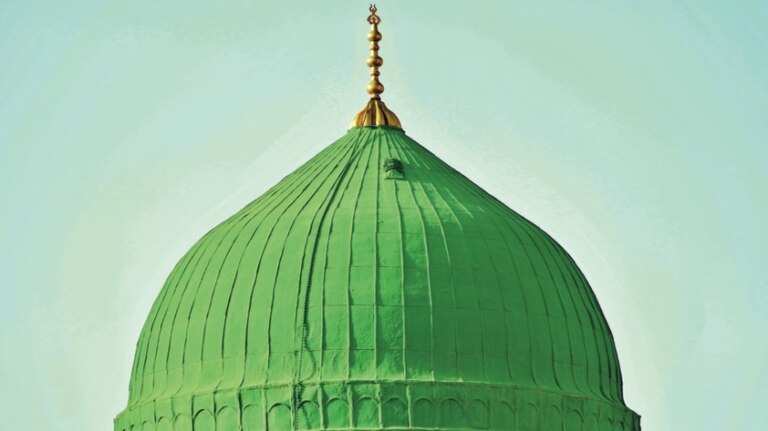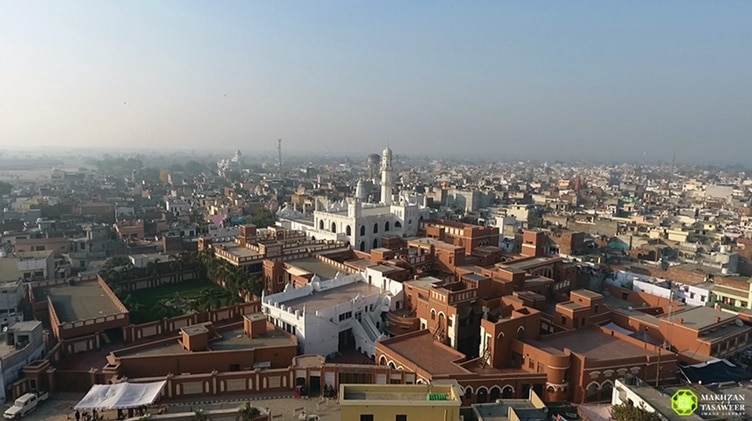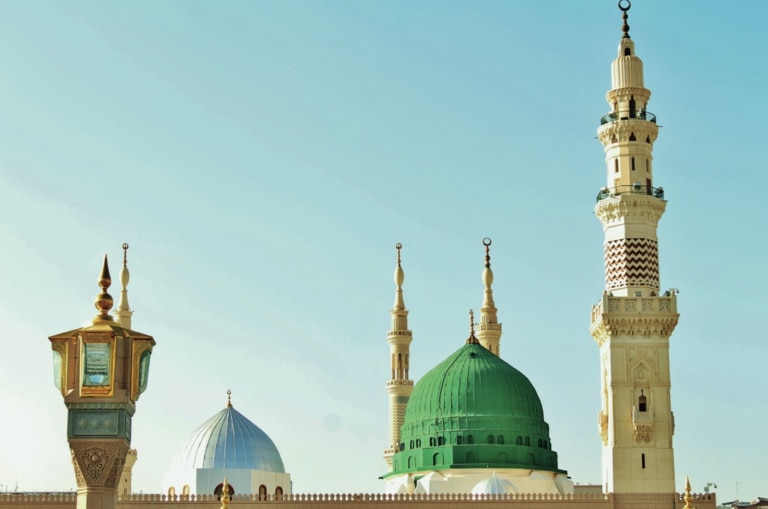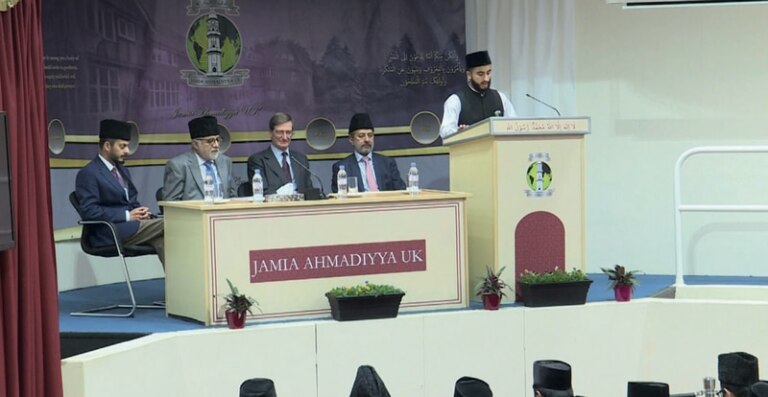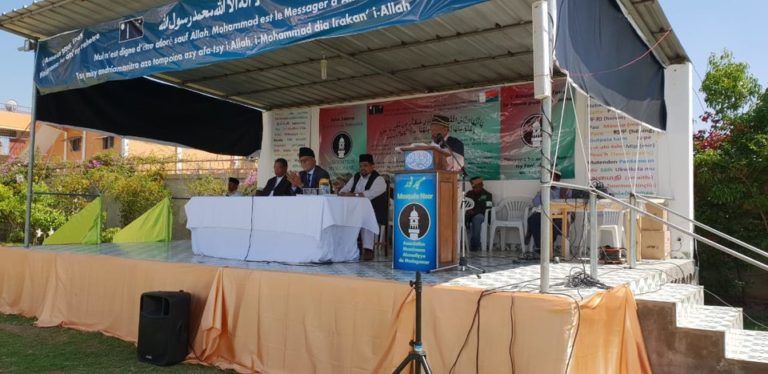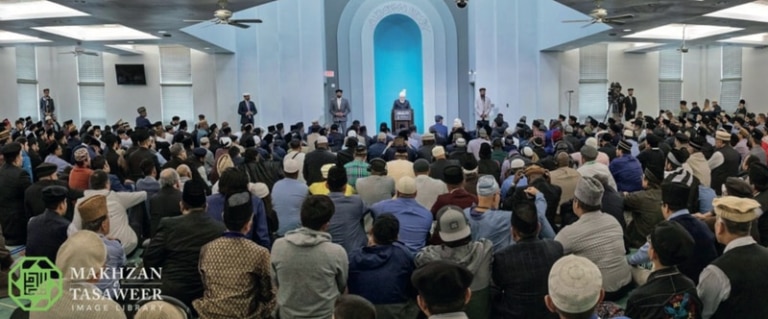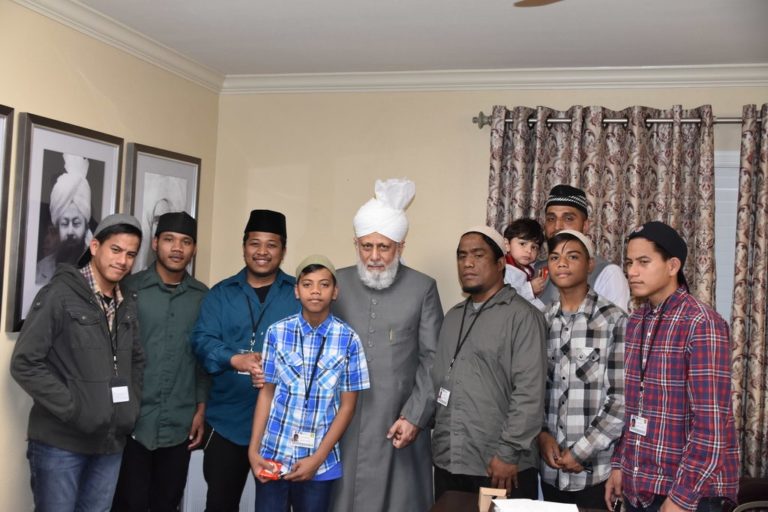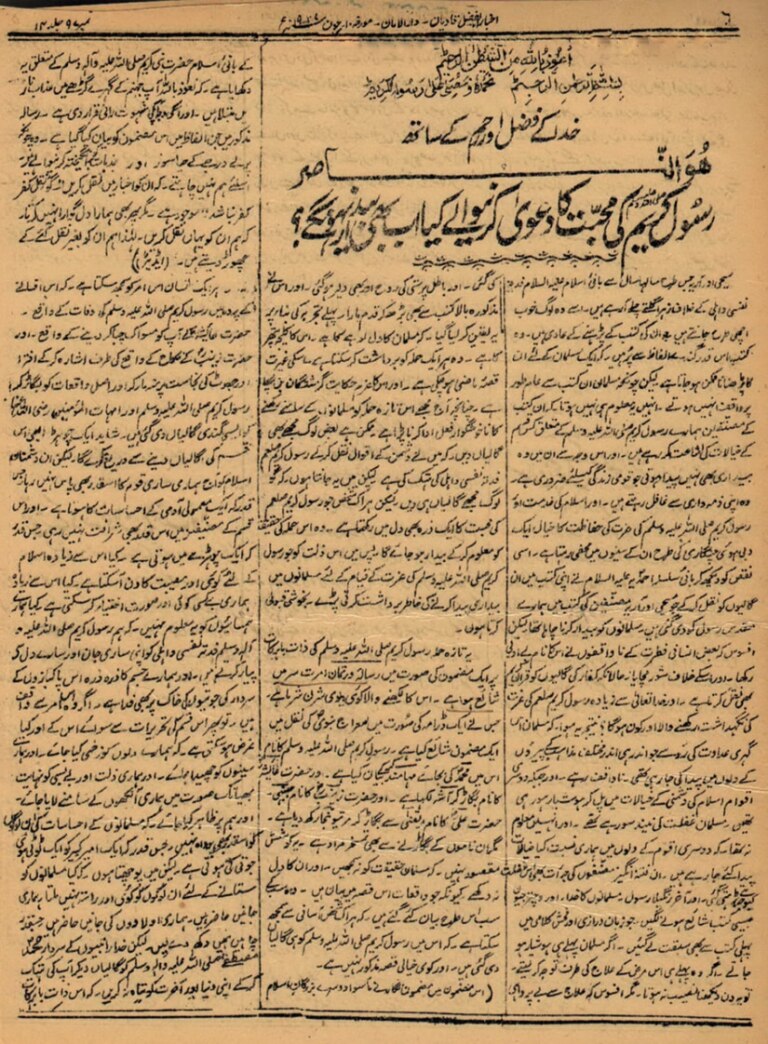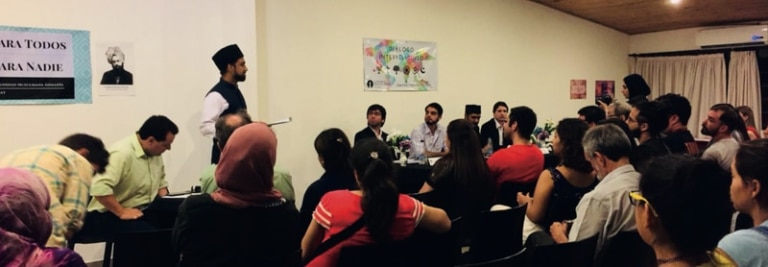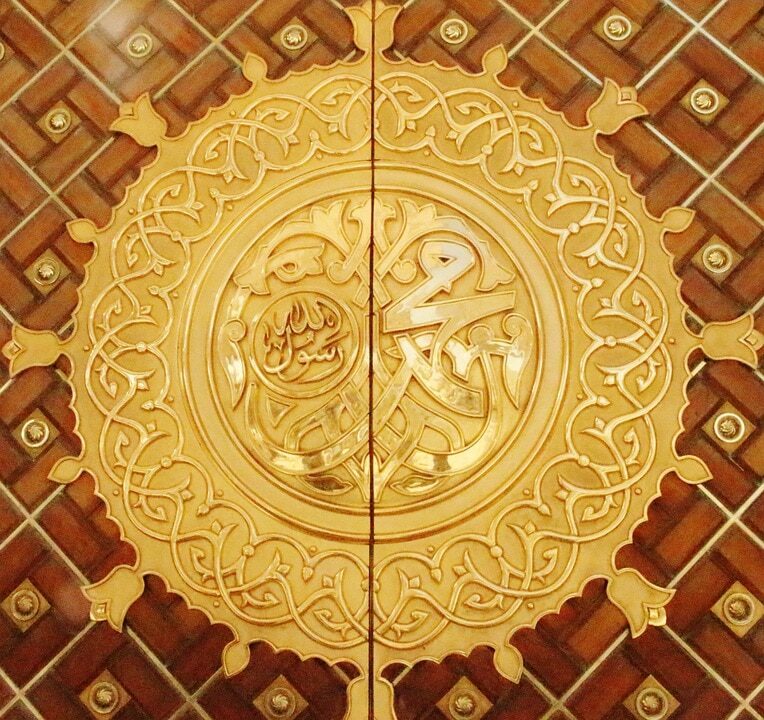Friday Sermon
2 November 2018
Attributes of True Ahmadis
After reciting the Tashahud, Ta‘awuz, and Surah al-Fatihah, Hazrat Khalifatul Masih Vaa stated:
Every individual – man or woman – who calls him or herself an Ahmadi, their mere verbal statement that they believe in the Promised Messiahas or believe in his claim, does not make them true Ahmadis. Rather, the Promised Messiahas has put forward certain conditions and responsibilities with this proclamation. He has drawn our attention towards some obligations stating that, if one acts upon these and fulfils these responsibilities, only then will they be counted among his Community. In other words, a mere change of doctrine does not suffice for one to be an Ahmadi. One must not become content by simply saying, “My parents were Ahmadis. Therefore, I am also an Ahmadi”, or saying, “I believe in the claims of the Promised Messiahas to be truthful, and as a result of this, I am an Ahmadi.”
As far as the belief in doctrine in concerned, this undoubtedly makes one an Ahmadi. However, in order to practically become an Ahmadi, it is incumbent to act upon the things which the Promised Messiahas expected from an Ahmadiwith all of one’s faculties and capabilities. He very clear stated that, if you are not trying to act upon all of these things with all of your abilities, then your entire claim is merely a verbal statement and nothing more than lip service. He said:
“To take Bai‘at[pledge of allegiance] means giving your life to Almighty Allah. It means, ‘Today we have sold our life to Allah Almighty.’” (Malfuzat, Vol.7. p.29, UK, 1985.) Thus, this is no trivial matter. When we sell some of our belongings to someone, then we cease to have any right over that possession, instead, the individual to whom we have sold that belonging becomes the owner of it. He then makes use of it as he pleases. Thus, this is that state that we have to adopt and this is the mentality we ought to possess regarding our lives. The Promised Messiahas states that in order to achieve such thinking and such a state, “the person taking Bai‘at has to first adopt meekness and humility and has to distance themselves from their ego and selfishness.”
These are the words of the Promised Messiahas that “one has to distance themselves from their ego and selfishness.”
Some people’s state of conceit and selfishness is such that at one place, an office-bearer was angry with a fellow office-bearer and so, did not come to the mosque for prayers, despite my presence, simply because his relationship was strained with the other office-bearer. The state of egotism and selfishness was to such a degree that although the claim is to have pledged allegiance to Khilafat, but Khilafat is not truly valued. Thus, the Promised Messiahas states that if one undertakes the Bai‘at, then one must distance themselves from their own ego and selfishness.
The Promised Messiahas said, “Then that person becomes worthy of advancement. But the one who continues to hold on to their ego alongside taking Bai‘at, will never receive any grace.”(Malfuzat, Vol.6. p. 173, UK, 1985)
Although this individual verbally professes belief and may extend greetings with respect, however, due to mutual grudges they do not even care in the slightest that the Khalifa of the time is present and they should be going to the mosque to offer prayers behind him, rather than deciding to come or not come to the mosque based on any other office-bearer. All the meanwhile, that individual himself is also an office-bearer. Thus, if this is the state of a person, then there is no need for such an individual to be an Ahmadi.
Thus, “selling of one’s life” means that one should adopt humbleness and humility. It requires one to annihilate one’s ego and to eradicate one’s ego and selfishness. In such a case, one does not own anything and everything should be subject to the commandment of Allah the Exalted. When one develops this state then it is not possible that God Almighty would destroy such a soul. Once you have offered your life to Allah the Exalted, He values it and protects it in every way. The Promised Messiahas has stated, “If your actions are contrary to your pledge at the time of Bai‘at [pledge of initiation] then there is a great disparity in your words.” There would be a huge discrepancy between your word and deed. “If you keep a distance from God, then in turn He will also keep a distance from you.” (Malfuzat, Vol.4. pp. 70-71, UK, 1985)
The Promised Messiahas says: “… Therefore, you should evaluate your faith and your deeds as to whether you have achieved a transformation and a purification which will allow your hearts to be accepted at the throne of God, by which you can be granted the shade of His protection.” (Malfuzat, Vol.4. p. 70 footnote, UK, 1985)
The Promised Messiahas then states “I have repeatedly told my Jamaat that you should not merely rely on this Bai‘at. You will not attain salvation until you reach the true essence of the Bai‘at.” (Malfuzat, Vol.4. pp. 232-233, UK, 1985)
The Promised Messiahas says:
“I advise you repeatedly that you should purify yourselves to such a degree in the same manner the Companions of the Holy Prophetsa transformed themselves.” (Malfuzat, Vol.4. p. 70 footnote, UK, 1985)
Thus, look at the wonderful and pure transformations of the Companions.
Instead of refraining from attending the mosque due to trivial quarrels, they transformed years of enmities – which transcended generations – into love, affection and brotherhood merely for the sake of God Almighty. They sold their lives. In turn, those who were previously completely ignorant, became educated and following this, they became godly people. They accepted with their life and soul the fact that from that day onwards they possessed nothing of their own, instead everything belonged to God Almighty. When they repented from Shirk [associating partners with God], they tried to repent from the subtle forms of Shirk as well.
What is a subtle or hidden form of Shirk? Elaborating on this, the Promised Messiahas states:
“Shirk does not merely refer to worshipping stones etc. Rather, worshipping [various] material means and revering worldly gods are also forms of Shirk.” (Malfuzat, Vol.6. pp. 18-19, UK, 1985.) What is meant by worldly gods? These are worldly gains, for which a person neglects and discards the commandments of faith and God Almighty.
The Holy Prophetsa said that ostentation in one’s deeds and being entangled in its hidden desires are also forms of Shirk. (Mustadrak lil Hakim, Vol.4, p. 366, Kitabul Riqaaq, Hadith No. 7940, Dar-ul-Kutub-ul-Ilmiyyah, 2002, Beirut.) If a person discards a religious command and fulfils a worldly desire instead, he becomes guilty of Shirk.”
The Companionsra were so fearful of Allah the Exalted that it is mentioned in relation to one companion that he was once sitting down and crying. Someone enquired of him the reason for crying, upon which he said, “I remembered this statement of the Holy Prophetsa when he said, ‘I am fearful that my Ummah will become engrossed in Shirk and their hidden desires.’” (Musnad Ahmad bin Hanbal, Vol. 5, p. 835, Shidaad bin Aus, Hadith 17250, Aalam-ul-Kutub, Beirut, 1998)
This was the high status of the Companions’ fear of Allah the Exalted and their desire to abstain from Shirk. As a matter of fact, they were also concern for others, believing that there would be people born in this Ummah, who would commit hidden forms of Shirk. A thought had entered his heart and as a result of this thought alone, his body started to shake, he became distressed and began to cry. This is the very state that allows a person to develop and become a true believer in the Oneness of God and His true worshipper.
The Promised Messiahas states:
“Tawhid [unity of God] does not connote that a person merely utters ‘La Ilaaha Illallaahu’ [there is no God but Allah] with his tongue, whereas his heart is possessed with thousands of idols. Rather, the person who honours his efforts, schemes, deceptions and plans in the manner that God should be revered, if he has trust or reliance in another person as he should have reliance in God the Exalted, or if he honours himself as he should honour God; in all these circumstances, he becomes an idolater in the sight of God the Exalted.”
The Promised Messiahas states:
“… Every object, word or deed, which is given the same grandeur as is the due right of God the Exalted, is an idol in the sight of God… It should be remembered that the true Oneness of God, the proclamation of which He desires from us and to which salvation rests on, is to hold the Being of Allah to be pure from any form of Shirk, whether it is in the form of an idol, person, the sun, the moon, one’s own self or his scheme, plan and deceit. Furthermore, it is to not suggest anyone more powerful in comparison to Him, to not accept anyone else as the provider, as the one who grants honour and the one who disgraces as one’s personal honour and disgrace is dependent on these people.” (Sirajuddin Isai Kay Chaar Sawalon Ka Jawaab, Ruhani Khazain, Vol. 12, pp. 349-350)
Rather, one should believe all these matters to be purely reliant on God Almighty alone.” Thus, this is the fundamental principle of Islam, which is also the fundamental principle of Ahmadiyyat, the true Islam.
Someone said to me that people give such a high status to Khilafat and the Khalifa of the time, to the extent that they have reached this stage of Shirk. It should be clear that the Promised Messiahas came in servitude to the Holy Prophetsa in order to eradicate Shirk from the world. Hence, it is impossible that his true Khilafat could increase or encourage any form of Shirk. The fundamental task of Khilafat is to eradicate Shirk, establish the unity of God and to fulfil and complete the mission for which the Promised Messiahas was commissioned. If a person forms this opinion having seen another person meet the Khalifa with honour and respect, then instead of judging, they ought to reflect over the fact whether or not he is thinking ill of another person. Therefore, if this is in fact the case, then those who think ill of others should refrain from doing so. However, if someone has truly reached the stage where he is giving others the impression that he is, God forbid, elevating the status of the Khalifa to a form of Shirk, then he should do Istighfar and also be cautious. I never desire for this and nor have I ever done so. In the same way, no past Khalifa, neither any Khalifa in the future – God Willing – will ever desire for their own personality to be given importance. Indeed, it is the responsibility of the Khalifa of the time to establish the respect and honour for Khilafat. As it is his duty, he will continue to do so. Moreover, he will do so because according to the promises of Allah the Exalted and the prophecy of the Holy Prophetsa, the unity of God was to be spread throughout the world through Khilafat and at the same time, Shirk was to be eradicated from the world through Khilafat. Thus, some weak-minded people, who develop these thoughts as a result of a lack of tarbiyat [moral and spiritual training], should erase these thoughts from their minds.
Following the important task of establishing the unity of God and to purify the hearts of his followers from Shirk, the Promised Messiahas took a pledge from us that we would refrain from falsehood and moral evils. Allah the Exalted states in the Holy Quran:
فَاجْتَنِبُوا الرِّجْسَ مِنَ الْاَوْثَانِ وَاجْتَنِبُوْا قَوْلَ الزُّوْرِ
This means, “Shun therefore the abomination of idols, and shun all words of untruth.” (Surah al-Hajj: V. 31)
Elaborating on this, the Promised Messiahas states:
“The Holy Quran has declared falsehood to also be an impurity [something which is filthy and impure.]”
The Promised Messiahas states:
“… Ponder over the fact that here [in this verse] falsehood has been compared with an idol and as a matter of fact, falsehood is also an idol. Otherwise, why would a person forsake the truth and turn to falsehood. Just as there is no reality or truth behind the worship of an idol, there is nothing behind falsehood apart from hypocrisy.” (Malfuzat, Vol. 3, p. 350, UK, 1985)
There is a sense of superficiality in falsehood. Apparent words or texts are presented in a sugar-coated manner. They are presented in a beautiful manner, even though they are hollow.
Following this, the Promised Messiahas states:
“Falsehood is also an idol and the person who places his faith in this, removes his faith in God. Hence, by telling lies, one also loses God.” (Islami Usool Ki Philosophy, Ruhani Khazain, Vol. 10, p. 361)
Hence, if one claims to believe in the oneness of God, if one claims to worship Him and if one desires to become a true believer then we must forsake lying and falsehood and those who lie. There are some who lie even in trivial matters. This is not the hallmark of a believer. One should not come under the impression that small inaccurate statement are not lies. They most certainly are lies and take one far away from Tawhid [Unity of God]. There are countless issues and disputes between people in which one lies in order to sway the decision in his or her favour. In what minute detail has the Holy Prophetsa warned us about lying? If one ponders over this carefully, their hairs will stand on end. The Holy Prophetsa said that if one says to a young child “Come, I shall give you something” and then gives them nothing, then this too falls under the category of lying. (Sunan Abi Daud, Kitab-ul-Adab, Baab Fi Al-Tashdid Fi Al-Kizb, Hadith no, 4991)
A lie, even if said as a joke, is still a lie. The Holy Prophetsa then said that lying leads one to indecency and sinfulness, and these lead one to hell. Indecency and sinfulness mean to deviate far away from truthfulness and to be extremely sinful. Hence, we must always analyse ourselves as to whether we have a high level of truthfulness, or that high standard of truthfulness which the Holy Prophetsa has described, and which he has said leads one to heaven. (Sunan Abi Daud, Kitab-ul-Adab, Baab Fi Al-Tashdid Fi Al-Kizb, Hadith no, 4989).
Then there is an evil which the Promised Messiahas has particularly spoken about and especially admonished his followers to avoid. In fact it is included in the conditions of Bai‘at (oath of allegiance), and that is adultery. (Izaal Auham, Ruhani Khazain, Vol. 3, p. 563)
Now this does not only mean apparent adultery which happens through unlawful physical relations, rather he explained that as God Almighty has said:
وَلَا تَقْرَبُوا الزِّنَا
“And come not near unto adultery,” which means that one should avoid gatherings, occasions and opportunities in which these thoughts may come to mind. This is not just in the physical sense; even the thought that comes to mind should be eschewed. The Promised Messiahas states that:
“Do not tread such paths in which there is a chance of this sin being committed.” (Islami Usool Ki Philosophy, Ruhani Khazain, Vol. 10, p. 342)
Whatever chance or risk there is, it can lead one to committing adultery. In this day and age, there is the television and internet on which such inappropriate films are shown which openly incite one to adultery. Thus, it is the duty of every Ahmadi to avoid all of this. This is the reason for many disputes and quarrels in homes, and as a result there are many families that break or which have broken where the husband sits watching such films or is surfing the internet with indecent thoughts appearing in his mind. Many youths are being ruined as a result of this and have fallen into the wrong company because it becomes a habit of watching nudity and indecent films. This so-called progressive society considers this as freedom of conscience and advancement. However, we must protect ourselves from such evils. Now these people are themselves admitting that this is detrimental and if you research about these pornographic films then you will find that these lead to adultery, domestic violence, unlawful relationships and even the mistreatment of children and all this is happening due to indecent films.
The Promised Messiahas has stated to not allow even such thoughts to cross your mind. If even the thought comes to mind, then abstain from it. So now it is being proven that by watching this all these problems are being created. Therefore, every single Ahmadi must especially avoid all this.
Furthermore, to become a true Ahmadi the Promised Messiahas has drawn special attention to refrain from all kinds of injustices and wrongdoing. He states that if you wish to associate yourselves to him, then do not allow any thought of mischief, injustice or evil to cross your mind. (Majmua Ishtiharaat, Vol. 3, pp. 46-47)
The Holy Prophetsa was once asked about the biggest injustice? He answered that the greatest injustice was for one to take even a hand’s breadth of land from his brother i.e. seize it for himself. Even a pebble of that land, a small amount which can be held between one or two fingers, which he has taken wrongfully, even if it is the smallest of things then all the layers of land beneath it, i.e. however many layers of the land there are beneath it, will be made into a chain and placed as a collar which that person will carry around his neck on the Day of Judgment. (Musnad Ahmad bin Hanbal, Vol. 2, pp. 59-60, Musnad Abdullah bin Masud, Hadith no. 3767)
Now, lands which are thousands of miles long have layers beneath them from one side to the other. Imagine how immense a burden will be placed one someone due to this. It is such a grave punishment that one cannot begin to envisage. Hence, to usurp the rights of others is a severe injustice and sin. We convey to others the beauty of Islam and say that the highest standard of the upholding of rights of others is encompassed in the teachings of Islam. Instead of taking one’s rights Islam draws our attention to fulfilling the rights of others. We emphatically and openly exclaim this, but if our actions are in contradiction to this then we will be sinners and will be speaking a lie. Therefore, every Ahmadi must analyse him or herself in this regard in minute detail. If our actions are in harmony with our teachings, then our tabligh [propagating the message of Islam] will also be fruitful and we will have a positive influence on others. The standard which the Promised Messiahas set, which has been mentioned, is that one should not even let the thought of doing an injustice come to mind, no matter what it may be.
Furthermore, an important condition of being a believer is to worship God Almighty, rather, God Almighty has deemed this worship to be the purpose of the creation of man. The Promised Messiahas has stated:
“O ye people who consider yourselves members of my community! You will be counted as such in heaven when you truly tread upon the ways of righteousness. So, offer the five daily prayers in such fear and with such complete attention as though you were actually beholding God Almighty.” (Kishti-e-Nuh, Ruhani Khazain, Vol. 19, p. 15)
The Promised Messiahas then states that it is incumbent on every Muslim to pray five times a day. It is said in a Hadith that a group of people who accepted Islam came to the Holy Prophetsa and said, “O Messenger of Allah, permit us to be excused from praying because we are traders and it is very difficult for us to pray five times a day and we also have large herds.” They had a herd or they would graze them, they worked outside and this was a very demanding task. “Our clothes get ruined and we cannot rely on this, nor do we have the opportunity to do so. Due to this preoccupation we cannot pray five times a day.” The Holy Prophetsa answered, “If there is no prayer, then what remains at all? That religion is no religion at all which has no prayer in it.”
The Promised Messiahas then states, “What is prayer? It is to present your humility and shortcomings before God Almighty and to beseech from Him for all that you require.” He also states that the love of God, fear of Him and to remember Him in your heart is prayer, and this, in short, is religion. He then states that whoever wishes to excuse himself from prayer, what does he or she achieve more than animals? Theirs is the same condition as animals – to merely eat, drink and sleep like animals can never be called religion, rather it is the way of the disbelievers. (Malfuzat, Vol. 5, pp. 253-254, 1985, UK)
Thus, the Promised Messiahas has clearly stated that the distinction between men and animals is the worship of God Almighty and prayer.
If our attention is not being drawn towards prayers, then we can gauge for ourselves as to which category we fall in. I have reminded on many occasions and continue to do so that if the Salat centre or the mosque is far away then the local houses should get together and designate a place where the prayer can be offered. This will not only enable you to partake from the blessings of praying in congregation but will also continuously remind you and the future generation about prayers and provide the means for their reformation. The future generation will also be inspired towards prayers.
We are focusing our efforts on the construction of mosques and are building many. Insh-Allah tomorrow the mosque in Virginia will be inaugurated. However, if we are not inclined towards offering prayers, then what is the point of building these mosques? I have repeatedly mentioned that if the office-bearers of the auxiliary organisation as well as at the Jamaat level, focus their attention towards attending prayers, then the attendance at prayers will multiply manifold and through this we can also train the future generations. There is an instruction of the Holy Prophetsa in relation to prayer which truly causes one to shake to the core. The Holy Prophetsa states, the first thing for which a person would be called to account for on the Day of Judgement is prayer. If one succeeds in this account, they would be successful and will attain salvation. If that account is deficient, he will have failed and will be a loser. (Sunan Al-Nisai, Kitab-ul-Salat, Hadith no. 466)
Thus, it is no ordinary matter if one fails to fulfil the due rights of focusing their attention on prayer. May God Almighty enable every Ahmadi to fulfil the dues of this right.
The dues of this right will not only be fulfilled though the obligatory prayers alone, in fact the Promised Messiahas has stated that one should also focus towards the Nawafil [voluntary prayers] and Tahajud [pre-dawn voluntary prayer]. (Malfuzat, Vol. 3, p. 254, 1985, UK)
The Holy Prophetsa has stated, if there is a shortcoming in the obligatory Prayers as one can have a deficiency in this regard, Allah will fulfil it through the Nawafil. (Sunan Al-Nisai, Kitab-ul-Salat, Hadith no. 466)
However, this is only possible if one is in the habit of offering Nawafil. Therefore, it is also important to offer the Tahajud and Nawafil prayers and one should pay heed towards this.
Another extremely important aspect which every Ahmadi should be mindful of is to constantly pay attention towards seeking forgiveness for their sins. Man is weak, and at times, despite trying not to, ends up committing mistakes. However, God Almighty simply does not look to every opportunity to punish people for their mistakes. In fact, God Almighty has prescribed a method through which one can seek forgiveness for their sins and safeguard themselves from committing them in the future as well, and that is through Istighfar [seeking forgiveness]. The Holy Prophetsa has stated that God Almighty does not punish one who remains engaged in Istighfar. (Surah al-Anfal: V.34)
Even if there are a few individuals who are seeking forgiveness, they can become the means of forgiving the sins of many others and they are also saved. In relation to this the Promised Messiahas states that some people are aware of the sin they have committed, whereas others are oblivious to their transgression. Therefore, God Almighty has made Istighfar incumbent for all times. Whether one is aware of committing a sin or not, they should remain occupied with Istighfar. A mistake can be committed at any occasion, and sometimes even unknowingly. The Promised Messiahas says that Istighfar has been inculcated so that one should continue to seek God’s protection from all sins—obvious or hidden, known or unknown, whether committed by hand, legs, tongue, nose, or eyes.
That is, every part of one’s body can become guilty of committing sin. Thus, Istighfar protects one from committing sin from every part of the body. Therefore, one should strive to remain in the protection of God Almighty. For this, the Promised Messiahas has instructed the following prayer of the Holy Quran to be read in this day and age, and that prayer is:
رَبَّنَا ظَلَمْنَآ اَنْفُسَنَا وَاِنْ لَّمْ تَغْفِرْلَنَا وَتَرْحَمْنَا لَنَكُوْنَنَّ مِنَ الْخٰسِرِيْنَ
That is, “Our Lord, we have wronged ourselves; and if Thou forgive us not and have not mercy on us, we shall surely be of the lost.” (Malfuzat, Vol. 4, p. 275)
رَبَّنَا ظَلَمْنَآ اَنْفُسَنَا وَاِنْ لَّمْ تَغْفِرْلَنَا وَتَرْحَمْنَا لَنَكُوْنَنَّ مِنَ الْخٰسِرِيْنَ
(Surah al-A‘raf: V.24)
The Promised Messiahas states:
“When one seeks strength from God – that is, to do Istighfar – they can become free of those weaknesses with the aid of the Holy Spirit.” (Kishti-e-Nuh, Ruhani Khazain, Vol. 19, p. 34)
The Promised Messiahas has placed another fundamental condition for his followers which is that they should fulfil the due rights of fellow man and abstain from causing any kind of harm to the creation of God Almighty. (Izala Auham, Vol. 3, p. 564)
Whilst drawing our attention towards constantly looking deep into the condition of our hearts, the Promised Messiahas states that we must instil the fear of God Almighty in our hearts which leads us to show compassion to His creation and become its well-wishers. It has been mentioned in a Hadith that the Holy Prophetsa stated to not be jealous of one another. Do not quarrel among yourselves. Do not entertain malice against each other. Do not have enmities against one another. None of you should usurp the business transaction or trade deal that has been settled by someone else. Become brothers to one another. A Muslim does not oppress his brother. He does not humiliate him nor show him contempt. To think low and show disdain to his Muslim brother is enough to constitute an evil on his part. The blood, property and honour of every Muslim are unlawful for another Muslim. (Sahih Muslim, Kitab-ul-Bir Wa Al-Sila, Hadith no. 6541)
This is something that should be demonstrated from us Ahmadis more than anyone else, and by grace of God Almighty, it is being demonstrated to a large degree. Today, if all the Muslims were to understand this principle and adhere to it, as well as the Muslim governments, then the cruelties perpetrated by Muslims upon each other, which has consequently resulted into the destruction of lives and property, and hundreds of thousands of children and women are becoming orphaned and widowed and the elderly are dying, will no longer happen.
Then, arrogance is another major ill, which God Almighty has taught us in the Holy Quran to refrain from. The Holy Prophetsa has also drawn our attention to this and stated that one whose heart has arrogance as little as a small grain will not be allowed to enter paradise. (Sahih Muslim, Kitab-ul-Iman, Hadith no. 267)
The Promised Messiahas states:
“Thus, in my opinion, this is a fine way to become purified. It is impossible to find a better way than to discard arrogance and pride of any sort – about one’s education, family or wealth.” (Malfuzat, Vol. 7, p. 276)
The Promised Messiahas further states,
“…I admonish my Jamaat to shun arrogance, because arrogance is most loathsome to Allah, the Lord of Glory.” (Nuzul-ul-Messiah, Ruhani Khazain, Vol. 18, p. 402)
Even on the occasion of Hajjatul-Wada [the farewell pilgrimage] the Holy Prophetsa stated, all men, whatever nation or tribe they may belong to, and whatever station in life they may hold, are equal. No black person is superior to a white and no white person is superior to a black person. And an Arab has no superiority over a non-Arab, nor a non-Arab over an Arab. (Al-Jami Li Sahibil Iman, Vol. 7, p. 132, Hadith no. 4774, Maktabatul Rushd, 2003)
Thus, this is the teaching we have been given regarding humility, equality, and abstaining from arrogance and pride – and each of us should adhere to this teaching. In the non-Muslim world, there exists discrimination between the black and white race. In fact, now certain leaders have even claimed that the mental abilities and faculties of people belonging to the white race are superior to those of non-white. Such is the state of their arrogance and every Ahmadi should abstain from such thinking.
On two separate occasions in a gathering with young women, it was expressed that here in the USA Jamaat that there is racial discrimination. For whatever reason the young generation is thinking this, this is extremely wrong. Lajna, Khuddam and Ansar and also the tarbiyat department of the Jamaat should investigate into this as to why such concerns are being raised. If there is any reality to this then they should make an effort and morally train others with wisdom and love so that these concerns and reservations are removed. No auxiliary organisation or any office-bearer should conduct this work in a hastily fashion or make rash decisions, nor should they start investigating into who it was who said this. Rather, they should assess whether or not there is any truth to this. If this is not the case, then why have such questions been raised? They should assess whether these issues are developing owing to personal grudges? However, whatever the causes are, we should eradicate this ill from within us with love and wisdom. The young woman who raised this concern to me, I also told her to write a detailed report to me as to why she felt that there is racial discrimination developing within the Jamaat. Nonetheless, this discrimination is also a form of arrogance and we have to protect ourselves from arrogance in whatever form it may exist.
Another aspect which the Promised Messiahas has drawn our attention towards and which God Almighty and the Holy Prophetsa have also instructed us to perform, is financial sacrifice. By the grace of God Almighty, the Jamaats across the world are excelling in offering financial sacrifices. And, by the grace of God Almighty, the USA Jamaat also fully partakes in making financial sacrifices whenever they are called upon, whether it is in a condition of emergency or a for a particular project. However, in view of the stats and figures available, or are being sent, it shows that there is a lot of deficiency in terms of the contribution towards the regular system of Jamaat Chanda [donations]. Thus, there is a need to pay particular attention towards this. A person who is impoverished can seek permission to pay his Chanda at a reduced amount or at a reduced rate citing his straitened circumstances. However, those who enjoy a healthy income should assess whether they are paying their Chanda according to their income. It should not be the case that one should make deductions to their Chanda in the same way as when it comes to the payment of tax. One should assess their income because the payment of Chanda is a matter between the individual and God Almighty. The Nizam (administration) or the finance secretaries are not aware of what the Chanda payers’ actual income is, however God Almighty has full knowledge of it and even has knowledge of the state of one’s heart. If everyone was to pay their Chanda according to their actual prescribed rate, then I believe that very few appeals would need to be launched separately for the construction of the mosques and other Jamaat projects. Therefore, in view of this, everyone should assess their budgets again and revise their payments, if they had written a lower amount previously. I also share various accounts of new Ahmadis in how, after recently accepting Ahmadiyyat, they bring about a change in their conditions after. They improve in their spiritual conditions, their practical state and also giving practical attention to their worship. They understand the importance of financial sacrifices despite their improvised state and thus, God Almighty blesses them and grants them affluence in their financial state which leads to further strengthening them in their faith and devotion. The very meaning of the word qurbani [sacrifice] signifies that one does something after experiencing difficulty and hardship, and here it means to make a sacrifice in order to fulfil the needs of God Almighty’s religion. Therefore, those who give less than what they can easily give are not performing any qurbani, nor are they performing any favours for God Almighty.
Even if they do not contribute, God Almighty will provide those means by which the necessities of the faith are fulfilled. He has been ensuring that these means are fulfilled and shall continue to do so – God Willing. Thus, all those people who – despite living in comfort do not pay their Chanda according to the prescribed rate – I would like to draw their attention towards this matter so that they can become the recipients of God’s blessings.
Today, the last matter towards which I would like to remind you all is obedience. The Holy Quran has commanded us on several instances to obey God Almighty and His Messengersa, and also to show obedience to those who are in authority over you. Furthermore, the Promised Messiahas has also included obedience as one of the conditions of Bai‘at and that is for one to pledge that they will obey every ma‘ruf command, until their last breath. (Izala-e-Auham, Ruhani Khazain, Vol. 3, p. 564)
In all of our auxiliary organisation pledges, it includes the declaration that we will deem it essential to abide by every ma‘ruf decision made by the Khalifa of the time. Some individuals who have crooked natures or those with hypocritical mentalities say that since they have pledged to follow all ma‘ruf decisions, whereas some of the decisions made by the Khalifa are not ma‘ruf or are not ma‘ruf in their estimation. There are people of this nature in different parts of the world who present their own interpretations of this. Although there are only a handful people who hold this view – perhaps one in a hundred thousand – however, it is vital for this assumption to be refuted, as this can poison the minds of the younger generations. If every person decides to interpret the meaning of ma‘ruf themselves, the Jamaat cannot remain united and the argument will arise as to what is and what is not deemed to be ma‘ruf.
On one occasion, Hazrat Khalifatul Masih Ira explained this concept in the following words:
“There is another misconception which is regarding the concept of showing obedience to matters that are deemed to be ma‘ruf and that people will not follow those instructions they consider to be not ma‘ruf.”
He further said:
“In the Holy Quran, this word has been used for the Holy Prophetsa in the verse:
وَلَايَعْصِيْنَكَ فِيْ مَعْرُوْفٍ
Meaning, ‘Nor disobey thee in what is right’.”
Hazrat Khalifatul Masih Ira then says:
“Have these people also compiled a list of the ‘flaws’ of the Holy Prophetsa?” (Haqaiq-ul-Furqan, Vol. 4, pp. 75-76, under the verse Al-Mumtahina: 13)
Are certain instructions of his correct and others not? In the commentary of the words “Amr bil ma‘ruf”, the Promised Messiahas stated:
“This prophet does not give a command which is irrational.” (Barahin-e-Ahmadiyya, Pt. 5, Ruhani Khazain, Vol. 21, p. 420)
In other words, ma‘ruf decisions are those which are devoid of irrationality and also are according to the directives of the Holy Quran.”
Then it is mentioned in a Hadith that the Holy Prophetsa sent a delegation of the companions to a certain place. When they reached there, they lit a fire. The head of the delegation said in jest, “If I order you to jump into the fire, would you do so?” Some of the companions replied that this would be completely wrong as it would constitute suicide, however others said that it was imperative to obey the instructions of the Amir [leader]. Eventually the head of the delegation said that it was only a joke and the matter was finished. When they returned to Medina, the Holy Prophetsa was informed of the incident to which he said, “For those who are placed in authority over you, whosoever gives an instruction which is contrary to a commandment of Allah the Almighty, you must not obey him.” (Sunan Abi Daud, Kitab-ul-Jihad, Hadith no. 2625)
This is the explanation of ma‘ruf , in that any instruction which contradicts a commandment of God Almighty cannot be considered as ma‘ruf, but if the instruction is in line with the command of God Almighty and the Holy Prophetsa, then that instruction is ma‘ruf. Therefore, it is evident that showing obedience to ma‘ruf decisions is a vital instruction that we are bound by as they are instructions given to us by God Almighty and also the instructions by His Messengersa. Thus, until true Khilafat is established – and according to the prophecy of the Holy Prophetsa this Khilafat is to remain indefinitely, God Willing – this institution of Khilafat can never issue a directive which is contrary to the teachings of God Almighty and His Messengersa. The Khalifa will only issue commands which are in line with the Quran and the practice of the Holy Prophetsa.
As mentioned earlier, in the Holy Quran, the words obeying ma‘ruf decisions has also been used for the Holy Prophetsa as has been mentioned earlier. The Promised Messiahas has also used these words in the conditions of Bai‘at. Similarly, in relation to Khilafat-e-Ahmadiyya, these words are repeated during every pledge. The meaning of these words are clear in that it means to establish the commands of God Almighty and to advise the community to adhere to these instructions. Therefore, it is incumbent upon every individual who considers themselves as part of this Jamaat to abide by this pledge and obey every instruction issued by the Khalifa accordingly.
Hazrat Musleh Maudra has also explained this issue by saying that should there ever be a scenario whereby a wrong instruction has been issued, then since God Almighty Himself is to safeguard the institution of Khilafat, He will never permit the outcome of that decision to be harmful. Instead God Almighty will create those circumstances by which there will be a positive outcome from that instruction. (Tafsir-e-Kabir, Vol. 6, pp. 376-377, under the verse Surah al-Nur: 56)
Therefore, it is not the job of an individual to interpret what is a ma‘ruf decision. A ma‘ruf decision is one which is in line with the Quran, the practice of the Holy Prophetsa his sayings and also that which falls in line with the just arbitrator [Hazrat Mirza Ghulam Ahmadas] of this era. Through this way, the unity of the Jamaat can be maintained. The Promised Messiahas was sent by God Almighty for this very purpose, namely to unite the people and establish a community of sincere and obedient followers. Otherwise, the Promised Messiahas has clearly stated that he had no desire to merely increase the number of followers with those who had no idea of what obedience entails.
In this regard the Promised Messiahas states that if those who affiliate themselves with him and enter into his Bai‘at, fail to reform themselves and do not live their lives according to the teachings of God and His Messengersa, then such a person’s Bai‘at is futile. (Mawahib-ul-Rehman, Ruhani Khazain, Vol. 19, p. 276) & (Malfuzat, Vol. 6, p. 142) & (Malfuzat, Vol. 10, p. 334)
Thus, we will only fulfil the purpose of being an Ahmadi when we realise this truth and strive to attain it with all our faculties.
The Promised Messiahas says:
“Showing obedience is not a small matter or one that is easy to demonstrate. This requires a death on one’s part.” (Malfuzat, Vol. 4, p. 74, footnote, 1985, UK)
“Whosoever does not show complete obedience defames this community.” (Malfuzat, Vol. 4, p. 74, 1985, UK
The Promised Messiahas further says:
“I have advised my community on numerous occasions that one should not rely on the mere verbal proclamation of your pledge of allegiance. Until one understands the reality [of the Bai‘at], they cannot attain salvation.” (Malfuzat, Vol. 4, pp. 232-233, 1985, UK)
May God Almighty grant all of us true understanding of the Islamic teachings and enable us to act upon them. May we become those who fulfil the rights of entering into the Bai‘at of the Promised Messiahas and always remain attached to Khilafat with the utmost obedience; and also may we act upon every ma‘ruf decision made by the Khalifa with a sincere heart and demonstrate complete obedience. May Allah enable every one of us to achieve this.
(Translated by The Review of Religions)

